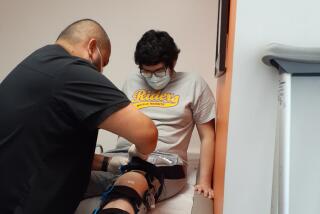Sizing up personal trainers
- Share via
HOPING to shape up and willing to shell out big bucks for a personal trainer to crack the whip? Make sure you know what you’re paying for.
Spending a lot of money on a high-priced trainer doesn’t necessarily mean you’re getting the most experienced or best-educated person for the job. It may only mean you’re getting the one who’s bringing the gym the most business or who’s got the most buzz, industry experts caution. With the numbers of personal trainers increasing -- and claims of celebrity connections proliferating -- cutting through that buzz can be difficult.
Cedric Bryant, chief exercise physiologist for the American Council on Exercise in San Diego, a “workout watchdog” group, says there’s not always “a nice correlation” between how much trainers charge and how competent they are. “Sometimes the trainer who is less technically competent but has better sales and marketing abilities could in fact be commanding a greater fee than an individual who is more qualified technically,” Bryant says.
“They may have that kind of rock-star persona that attracts people, not necessarily based on substance, but on hype and other things,” he says.
The “rock stars” at the gym could include popular high school or college athletes turned trainers, those with the best bods, and of course, those who work with athletes or celebrities.
“In California, L.A. in particular, personal trainers who hook up with celebrities, they’re always the ones who are writing the next book,” says Walt Thompson, a professor of kinesiology and health at Georgia State University in Atlanta and a spokesman for the American College of Sports Medicine. “If there’s celebrity backing, all of the sudden they’re the expert.”
Maybe they are, and maybe they aren’t. But even when a popular trainer’s credentials are thin, clubs still may hire him and allow him to charge higher fees because he draws a crowd -- and cash, according to Thompson, Bryant and others. “Commercial fitness facilities are a business,” Thompson says. “They tell you their mission is to make people healthy but they’re for-profit enterprises.”
Kathleen Rollauer, senior manager of research at the International Health, Racquet and Sportsclub Assn., a Boston-based trade group representing gyms across the country, doesn’t dispute the notion that high-priced trainers aren’t always the most skilled. “If you look at any other business, they have rainmakers and those who succeed, get commissions back,” she says. “If you’re a successful salesperson, you’ll earn your money.”
Gyms typically get a cut -- often half -- of a personal trainer’s fees, which can range from $50 to $200 or more an hour, says Rollauer. The gym sets the per-session fee for personal trainers employed by the club, while those who are not set their own fees, which is another reason why fees can vary within one particular club or personal training studio. Independent contractors may charge more simply because they feel they’re worth it, or they want to try to make more money for less work.
When gym managers set fees, they may have one set fee for all training sessions or they may offer tiered training -- in which some personal trainers charge one rate and others charge more.
In the latter case, many of the trainers who charge more probably do have more education, more experience and a solid track record with clients, Bryant says, but that’s not a given.
Which is why a trainer’s fee should be just one consideration when trying to gauge the person’s qualifications. “You don’t want to use it as your sole barometer or measuring stick,” says Bryant.
The personal training industry is unregulated. Someone can get a quickie certification over the Internet, call himself a personal trainer and start charging clients whatever he’d like, notes Thompson.
When choosing a trainer, do your homework. Don’t just go with the most popular trainer or the one your friend uses. Referrals are a good starting point, but you once you have a few names, interview them and check references, says Justin Price, owner of the BioMechanics personal training facility in San Diego and a member of the IDEA Health and Fitness Assn.’s personal training committee.
The number of trainers is increasing nationally, and some kind of track record is essential. Trainer membership in the San Diego-based IDEA Health & Fitness Assn., for example, has expanded from 7,848 in 2000 to 9,815 in 2006. Membership so far this year is already at 10,165. The American College of Sports Medicine issued personal training and health and fitness instructor certifications to 3,369 people in 2005, up from 1,996 in 2000. All of these represent just a portion of the estimated 40,000 to 80,000 personal trainers in the U.S.
Look for a college degree in the exercise science field and certification from one of the top certifying bodies such as the National Strength and Conditioning Assn., the American College of Sports Medicine or the National Academy of Sports Medicine.
IHRSA recommends that gyms only hire personal trainers whose certification is from a group with programs accredited by a third party such as the National Commission for Certifying Agencies. Of the estimated hundreds of certifying programs, only 11, including the three groups mentioned above, have or are in the process of receiving NCCA accreditation.
Also ask how many years of experience the trainer has -- look for a minimum of two to five -- and what areas they specialize in. If you have a bum knee or bad back, you’ll want a trainer who knows how to handle injuries. If you’re a woman aiming to slim your thighs, a muscleman with a drill-sergeant attitude may not be the best fit.
Ask for a free consultation to see whether you and the trainer click, says Price. “It is a personal relationship and you want to make sure you feel comfortable with that person’s personality, and vice versa,” he says.
Also be sure the trainer is focusing on you -- your health history and fitness goals. Beware the trainer who takes a one-size-fits-all approach to fitness, one who’s pressuring you to join the club (some trainers get kickbacks for referrals and sign-ups), and the name-dropper. Just because a trainer has worked with a high-profile client doesn’t mean his or her skills have improved as a result, Price says.
“I would never hire a personal trainer based on who they trained,” he says. After all, clients come and go. “It’s usually a fleeting thing.”
Rollauer agrees. “Regardless of whether they’re the top dog bringing in the money, if you don’t get along with them personally, you’re not going to go,” she says.
--
Times staff writer Jeannine Stein contributed to this report.


